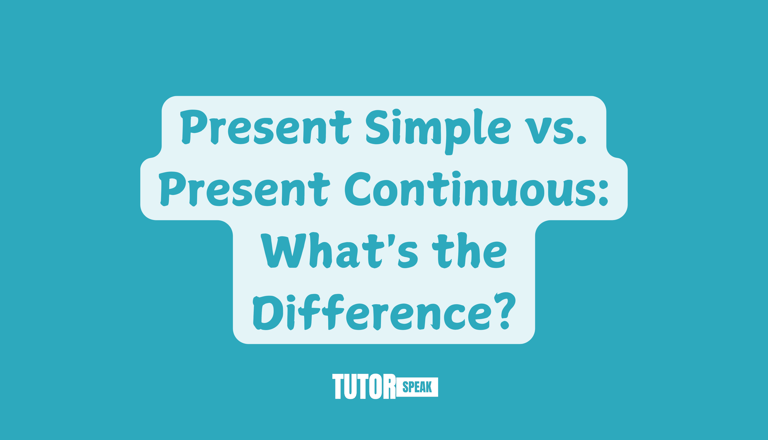Present Simple vs. Present Continuous: What's the Difference?
Understanding the difference between the Present Simple and Present Continuous tenses is essential for clear communication in English. While both tenses describe present actions, they have different uses. Let’s explore when to use each one, with examples and exercises to help you practice!
TutorSpeak
3 min read


Present Simple vs. Present Continuous: What's the Difference
In English, the Present Simple and Present Continuous tenses are used to describe actions, but they serve different purposes and convey different meanings. Understanding these two tenses is essential for mastering everyday communication and improving fluency. In this article, we’ll explain the differences between the Present Simple and Present Continuous tenses, provide examples, highlight common mistakes with corrections, and give you exercises to practice. Let’s get started!
Present Simple vs. Present Continuous: Key Differences
1. Present Simple:
The Present Simple tense is used to describe actions that are habitual, routine, or generally true. It is also used to talk about facts, universal truths, and regular activities.
Examples:
I study English every day. (habit)
Water boils at 100°C. (fact)
She lives in New York. (general truth)
Key Points:
Used for habits and routines: "I wake up at 7 am every day."
Used for facts and general truths: "The Earth orbits the Sun."
Used for timetables and schedules: "The train leaves at 9:00 am."
Does not usually use action verbs in a progressive form (e.g., "want," "know," "like").
2. Present Continuous:
The Present Continuous tense is used to describe actions that are happening right now or actions that are temporary. It is also used to describe future plans and arrangements.
Examples:
I am studying English right now. (action happening now)
They are watching a movie at the moment. (temporary situation)
We are meeting friends tomorrow. (future arrangement)
Key Points:
Used for actions happening right now: "She is reading a book."
Used for temporary actions or situations: "I am staying with a friend this week."
Used to describe future plans: "We are flying to Paris next week."
Verbs like know, believe, and like are not usually used in the continuous form.
Common Mistakes with Present Simple and Present Continuous
1. Mistake: "I am like coffee."
Correction: "I like coffee."
Explanation: The verb "like" is a stative verb and should not be used in the Present Continuous. The Present Simple is used to express likes and dislikes.
2. Mistake: "She is working every day."
Correction: "She works every day."
Explanation: If the action is a routine or habit, the Present Simple is the correct choice. The Present Continuous is used for actions happening at the moment, not for habits.
3. Mistake: "They play football now."
Correction: "They are playing football now."
Explanation: Since the action is happening at the present moment, the Present Continuous is required.
4. Mistake: "We are waiting for the bus every morning."
Correction: "We wait for the bus every morning."
Explanation: The action is a routine, so the Present Simple should be used.
Exercises to Practice Present Simple and Present Continuous
Exercise 1: Fill in the blanks with the correct form of the verb (Present Simple or Present Continuous).
She __________ (read) a book right now.
I __________ (like) to swim in the summer.
They __________ (study) for their exams this week.
We __________ (watch) a movie at the moment.
The sun __________ (set) in the west.
I __________ (not/understand) what you are saying.
He __________ (work) at the office today.
They __________ (play) tennis every Saturday.
Exercise 2: Correct the mistakes in the following sentences.
He is often playing soccer with his friends.
I am understanding the lesson now.
She eats lunch at the moment.
We are usually going to the park on Sundays.
They are always watching TV after school.
Exercise 3: Choose the correct tense (Present Simple or Present Continuous).
Right now, I __________ (talk) to my friend on the phone.
She __________ (work) at a bank every day.
We __________ (have) a meeting next Tuesday.
I __________ (not/know) the answer.
They __________ (run) in the park right now.
Exercise 4: Write sentences using the following prompts (Present Simple or Present Continuous).
I / go / to the gym / every day
She / study / for her test / now
We / visit / our grandparents / next weekend
They / not / like / horror movies
He / play / chess / right now



